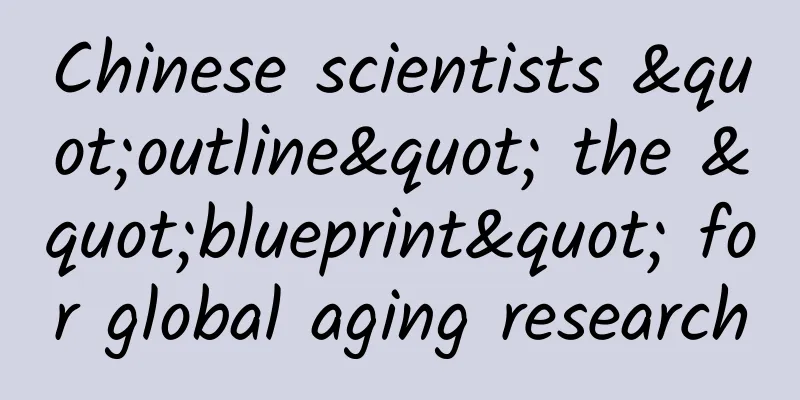Chinese scientists "outline" the "blueprint" for global aging research

|
With the advent of the 21st century, population aging and its impact on society have become increasingly prominent. The extension of life expectancy marks the victory of modern medicine and social progress, and also makes aging research a focus. The number of people aged 60 and above has increased significantly in recent decades and is expected to account for 22% of the global population by 2050. The population over 80 years old will triple between 2020 and 2050. As a result, the academic community's exploration of various aging intervention measures has gradually transformed from basic research to clinical practice, including small molecule drugs, gene therapy, regenerative medicine and immunotherapy. However, the rapid development of aging research has also brought about various ethical issues and social challenges, which involve multiple dimensions such as science and technology, metaphysics, and economic society, which require comprehensive understanding and cautious response. Recently, Researcher Liu Guanghui and Researcher Peng Yaojin from the Institute of Zoology, Chinese Academy of Sciences/Beijing Institute of Stem Cell and Regenerative Medicine jointly published a paper in the journal SCIENCE CHINA Life Sciences . Based on the cutting-edge development of aging research technology, they conducted empirical research on the ethical cognition of researchers in the field of aging research around the world, explored and deeply analyzed the ethical issues in this field, and outlined the ethical framework and governance blueprint for this important field. The coming of age of aging research Since the beginning of the 21st century, the global population structure has changed significantly, and aging research has developed rapidly, becoming a frontier field in biomedicine. With the deepening of global aging and the leapfrog development of biotechnology, aging research has shifted from symptom-centered research to mechanism-centered research, exploring a variety of innovative intervention methods including drugs, gene therapy, regenerative medicine and immunotherapy. Some interventions have entered the clinical trial stage, demonstrating their potential feasibility and effectiveness. Advances in research tools and methods, such as genome sequencing and the development of data science, have further enriched the research content in this field. However, the rapid development of aging research has not only brought the hope of extending life and health, but also brought complex ethical and social challenges. In the face of these challenges, the scientific community is actively exploring more comprehensive and inclusive research methods to ensure responsible and sustainable development in this emerging field. An empirical investigation of ethical cognition in global aging research The study investigated the ethical environment of aging research in the context of global attention to extending human lifespan, covering 180 top scientists in the field of aging research from 38 countries or regions, successfully capturing the world's diverse perspectives. 65.56% of the survey subjects were PIs, and 61.67% had more than 10 years of relevant research experience. Figure 1: Ethical and social concerns of scientists in the field of aging research around the world This study reveals the global aging research community's understanding of the nature of aging and its interventions. The survey showed that 146 of the 180 respondents (81.11%) believed that aging is a natural process rather than a disease, and only 24 (13.33%) believed that aging is a disease. This view is consistent with the traditional definition that aging is a natural process of gradual decline. In addition, 133 people (73.89%) believed that aging can be effectively delayed through specific interventions, and 144 people (80.01%) believed that the occurrence of aging-related diseases can be significantly reduced. This shows that researchers generally believe that biomedical research can improve the quality of life of the elderly and alleviate related health challenges. However, there are obvious differences in the opinions of respondents on the feasibility of extending human life, and 44 people (24.44%) are neutral about this, reflecting the complexity and uncertainty of this field. In addition, 93.33% of respondents believed that gender differences need to be considered when developing aging interventions, reflecting the scientific community's increasing awareness of gender bias. 82.78% of respondents emphasized the importance of fair access to technology, pointing out that aging interventions should benefit all social groups, not just a small number of wealthy people. 92.78% of respondents believed that international cooperation is necessary in addressing the global challenge of aging, indicating that researchers recognize that aging is a global challenge that requires the integration of resources, knowledge and expertise across borders. The survey results also showed that there are differences between basic research and clinical researchers in terms of the potential and practical feasibility of aging interventions. Basic researchers are more optimistic about delaying aging (Mean=5.69), while clinical researchers are more cautious (Mean=5.04). This difference may be due to the fact that basic researchers are more concerned about the possibility of scientific breakthroughs, while clinical researchers consider more about the complexity and challenges of current medical practice and patient care. Basic researchers show higher confidence in the possibility of extending human life (Mean=4.39), while clinical researchers are less confident (Mean=3.66). This difference suggests that basic research drives innovation and expands our understanding of possibilities, while clinical research applies these findings to actual medical practice. The cautious attitude of clinical researchers may stem from the complexity and challenges they encounter in translating basic research results into effective clinical interventions. In contrast, the optimism of basic researchers may drive them to continue to pursue breakthrough discoveries in aging research. In order to develop effective and ethical aging interventions, future aging research needs to enhance dialogue and cooperation between basic and clinical research to fully understand the challenges and possibilities of extending human lifespan and healthspan. Classification and grading of ethical issues in aging research This study revealed nine ethical issues in aging research and classified them into three categories using the K-means clustering algorithm (see Table 1): (A) key ethical issues, (B) relatively important ethical issues, and (C) ethical issues lacking consensus. Most respondents believed that false advertising and unequal access to technology were the main ethical concerns, which could erode public trust and exacerbate social injustice. Relatively important ethical issues include reliance on low-level animal experiment results for human intervention and protection of participants' genetic information and medical data, which require caution and rigorous verification. In addition, some ethical issues currently lack consensus among scientists, which reflects the complexity and dynamism of decision-making, which requires continuous dialogue and multi-party participation. Finally, this study recommends addressing these ethical issues by improving legislative and policy frameworks, especially in areas such as cell and gene therapy, to ensure the safety, effectiveness and fairness of aging interventions. By establishing clear regulatory scope and strict advertising norms, as well as promoting fair access to technology, public trust can be better maintained and the healthy development of aging research can be promoted. Table 1: Classification of ethical issues in the field of aging research Main research methods Based on databases such as Web of Science and PubMed, this study identified key ethical issues of concern in aging research, and designed and constructed a structured questionnaire after in-depth analysis and deliberation by experts and scholars in the fields of life sciences, bioethics, and law, covering 17 scientific, ethical, and social issues. The questionnaire was scored using a 7-level Likert scale and distributed to 9,077 researchers in the field of aging research around the world. Through three stages of data analysis, the system calculated statistical indicators such as mean and standard deviation, identified major ethical risks, and used the K-means clustering algorithm to classify nine major ethical issues, constructing a list of ethical risks in the field of aging, in order to comprehensively analyze the global researchers' understanding of ethical issues in the field of aging. The study was completed by the Chinese Aging Marker Research Consortium, the Institute of Zoology, Chinese Academy of Sciences, the University of Chinese Academy of Sciences, the Beijing Institute of Stem Cell and Regenerative Medicine, the Institute of Stem Cell and Regenerative Medicine, Chinese Academy of Sciences, Xuanwu Hospital of Capital Medical University, Beijing Institute of Technology, Xiamen University and other institutions. Researchers Liu Guanghui and Peng Yaojin from the Institute of Zoology, Chinese Academy of Sciences are the co-corresponding authors of the article. Researcher Song Moshi from the Institute of Zoology, Chinese Academy of Sciences, postdoctoral fellow Ding Lulu , and Associate Professor Xiao Zhenyu from the School of Life Sciences of Beijing Institute of Technology are the co-first authors of the article. |
<<: "Na Ying cried" is trending! This disease is as painful as burning, and doctors remind...
Recommend
How to maintain the uterus?
It is necessary to master certain methods to take...
How to prevent pregnancy after childbirth
With the continuous progress of society, people a...
Stomach pain before menstruation
Stomach pain before menstruation may be related t...
Can I eat soy products if I have kidney disease?
Author: Chen Zhou, Department of Nephrology, Shan...
Can moxibustion treat fungus?
Western medicine usually treats diseases through ...
What should women eat if they have weak spleen and stomach?
I believe everyone knows that if a woman has a we...
How to remove milk knots
It is not easy to get pregnant. You have to carry...
Is it normal to have a period that is 8 days late?
Menstruation is a phenomenon that women have ever...
How is HPV16 positive?
For everyone, any test result showing positive is...
Precisely sniping "Mr. Tumor"! Experts show you the secrets of radiotherapy, this "invisible scalpel"
Cancer, this dreaded disease, has more ways to fi...
Causes of bleeding the day after sex
Sexual intercourse is the most intimate activity ...
What medicine should I use for fishy leucorrhea?
Leucorrhea is a secretion secreted by the female ...
What is the reason for vaginal bleeding during pregnancy?
Many women experience vaginal bleeding when they ...
Why is my belly so big during pregnancy?
A woman's body will undergo great changes aft...
Why is my waist always sore?
Some women may cause certain harm to their bodies...









